A guide for Tan Son Nhat International Airport
Planning your Tan Son Nhat Airport departure but not sure where to start? As the busiest international gateway in Vietnam, Tan Son Nhat International Airport serves millions of passengers each year. In this article, we’ll cover step-by-step departure procedures, airport amenities, and insider tips to ensure a hassle-free start to your journey.
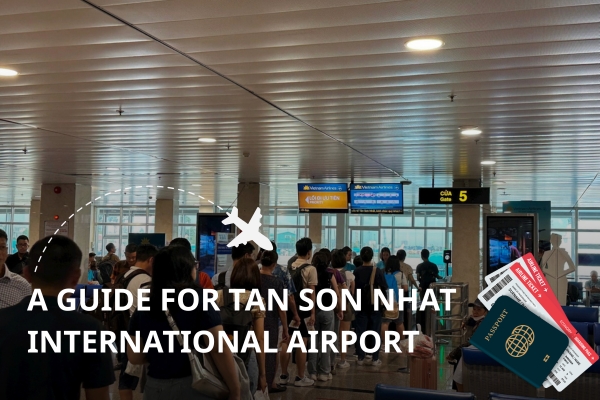
Overview of Tan Son Nhat Airport
Here are some general information about Tan Son Nhat Airport (Ho Chi Minh City) to help you visualize easily:
Location and accessibility within Ho Chi Minh City
Tan Son Nhat International Airport is the main airport for Southern Vietnam. It is the largest airport in the country. It covers about 850 hectares and can handle many passengers.
Located on Truong Sa Street, Ward 2, Tan Binh District, Ho Chi Minh City, the airport lies just 7 – 8 km north of the city center making it easily accessible from most urban areas.
General Information:
- Official name: Tan Son Nhat International Airport
- Location: Truong Sa Street, Ward 2, Tan Binh District, Ho Chi Minh City
- IATA code: SGN
- ICAO code: VVTS
According to ICAO standards, Tan Son Nhat is classified as a Level 4E airport, capable of accommodating large aircraft such as the Boeing 747, Boeing 777, and Airbus A350. It serves as both a domestic and international hub, connecting Ho Chi Minh City with numerous destinations worldwide.
The airport currently serves all major Vietnamese airlines. These include Vietnam Airlines, VietJet Air, Bamboo Airways, Pacific Airlines, Vietravel Airlines, and VASCO. It also hosts over 40 international carriers.
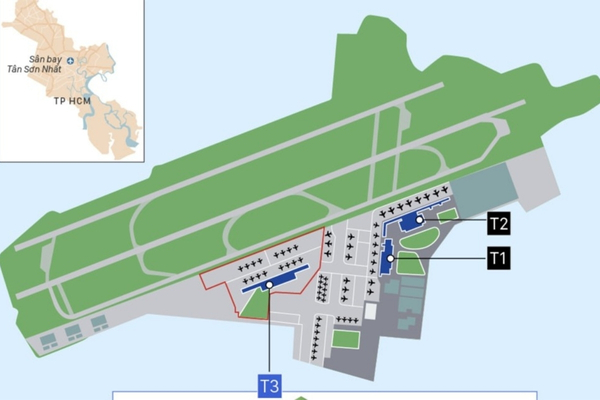
Airport terminals
Tan Son Nhat International Airport has two main passenger terminals:
- Domestic Terminal (T1): It covers 41,684 m². The terminal has two levels. The ground floor is for arrivals, and the first floor is for departures.
- International Terminal (T2): It covers 115,834 m² and has four levels. The ground and first floors are for arrivals. The second floor is for departures and waiting areas.
Both terminals are conveniently connected to Truong Son Road and located side by side. In addition to passenger services, the airport also houses a dedicated cargo terminal for air freight operations.
Preparing for your departure
Thoughtful preparation before your flight accounts for nearly 70% of a smooth and stress-free journey. To ensure everything goes as planned, here’s what you need to prepare in advance:
Essential documents
Having the right travel documents is crucial without them, you won’t be allowed to board your flight. Below is a quick checklist of the required documents depending on your flight type:
| Flight Type | Required Documents |
| Domestic flights |
|
| International flights | A passport valid for at least 6 months and a visa (if required by the destination country). |
Packing tips and airline baggage regulations
Each airline has specific rules regarding the weight and size of both carry-on and checked baggage. Understanding these in advance will help you avoid unnecessary delays or fees.
| Flight Type | Regulations |
| Hand Luggage (Carry-on) |
|
| Checked Baggage |
|
Tip: Always weigh your luggage at home before heading to the airport. This simple step can save you from costly excess baggage fees and ensure a smooth check-in process.
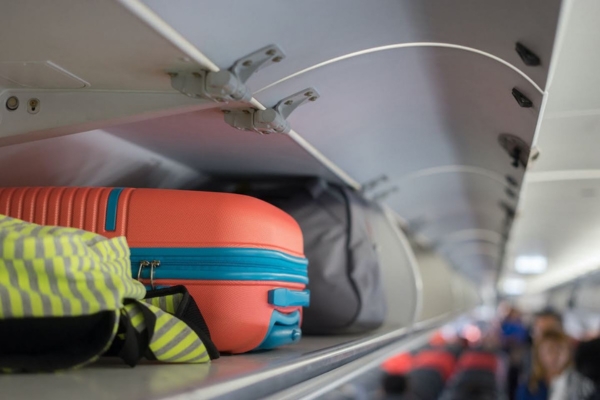
How to check flight status before leaving for the airport
Before heading to Tan Son Nhat Airport, it’s important to check your flight status to avoid delays or missed flights. Here are three reliable methods:
Method 1: Use the airline’s website or application
- Access: Visit the airline’s official website (e.g., vietnamairlines.com, vietjetair.com) or use their mobile app.
- Find the section: Look for “Flight Status” or “Manage Booking.”
- Enter details: Input your flight number, departure date, booking code, or full name.
- View results: You’ll see up-to-date details including departure time, delays, cancellations, terminal, and gate information.
Method 2: Call the airline hotline
If you need urgent confirmation or aren’t comfortable searching online, contact the airline directly. Hotline numbers are listed on each airline’s website.
Method 3: Use a third-party flight tracking apps
Apps like Flightradar24 or FlightAware provide real-time tracking and flight updates. However, for the most accurate information, always double-check with the airline’s official source.
How to get to the Tan Son Nhat airport
After arriving at Tan Son Nhat International Airport, travelers can choose from several convenient transportation options to reach their hotels or destinations in Ho Chi Minh City. Below are the most common and reliable ways to travel from the airport.
Taxi, ride-hailing apps (Grab), airport shuttles
Taxi
Taxis are one of the quickest and most comfortable ways to travel, especially for groups or travelers with heavy luggage. Below are some reputable taxi companies available at Tan Son Nhat Airport:
| Taxi Services | Detail |
| Phuong Trang – Futa Taxi |
|
| Mai Linh Taxi |
|
| VinaSun Taxi |
|
These companies are known for their professional drivers and transparent pricing, helping travelers avoid scams and overcharging.
Grab (Ride-Hailing App)
Using Grab is another popular, affordable, and easy option for first-time visitors to Ho Chi Minh City. Simply enter Tan Son Nhat Airport as your pick-up point in the app, and Grab will automatically assign a nearby driver.
To save time, head directly to lanes D1 and D2 on the ground floor for Grab pick-ups. Previously, passengers had to go to floors 3–5 of the TCP building, but the airport has now changed the pick-up area to make the process smoother.
Note: At the Domestic Terminal, cars are not allowed to stop for more than 3 minutes, so make sure you’re ready at the designated pick-up point when your driver arrives.

Public Buses
Taking a public bus is one of the most affordable and safe ways to travel from Tan Son Nhat International Airport to various districts of Ho Chi Minh City and nearby provinces. The bus pick-up area is located in the park zone near the airport, with several routes operating daily to popular destinations. Below are the main routes you can choose from:
| Public Buses from Tan Son Nhat Airport | Detail |
| Shuttle Bus 49: Tan Son Nhat Airport – District 1 | Operating hours: 00:00 – 23:45
Frequency: Every 20–30 minutes Fare: 40,000 VND/person Pick-up/drop-off: Lane B, Domestic Terminal |
| Route 103: Cho Lon Bus Station – Tan Son Nhat Airport – Ga Intersection | Operating hours: 05:00 – 19:00
Frequency: Every 12 minutes Fare: 7,000 – 9,000 VND Pick-up/drop-off: Lanes B17 – B19 |
| Route 109: 23/9 Park – Tan Son Nhat Airport | Operating hours: 05:30 – 01:00
Frequency: Every 15–20 minutes Fare: 12,000 VND (<5 km) / 20,000 VND (>5 km) Pick-up/drop-off: Lanes B17 – B19 |
| Route 119: Western Bus Station – Tan Son Nhat Airport | Operating hours: 04:00 – 21:00
Frequency: Every 15–30 minutes Fare: 12,000 VND (<5 km) / 20,000 VND (>5 km) Pick-up/drop-off: Lane B, Domestic Terminal |
| Route 152: Trung Son Residential Area – Tan Son Nhat Airport | Operating hours: 06:00 – 18:00
Frequency: Every 12–17 minutes Fare: 6,000 VND Pick-up/drop-off: Lanes B06 – B09 |
| Route 159: Eastern Bus Station – Tan Son Nhat Airport – An Suong Bus Station | Operating hours: 05:30 – 20:25
Frequency: Every 25–30 minutes Fare: 7,000 VND (<½ route) / 10,000 VND (>½ route) Pick-up/drop-off: Lane B, Domestic Terminal |
| Route 721: Tan Son Nhat Airport – Vung Tau Bus Station | Operating hours: 06:30 – 23:05
Frequency: Every 45–90 minutes Fare: 80,000 – 160,000 VND Pick-up/drop-off: Lanes B06 – B09 |
Driving and parking tips at the airport
Tan Son Nhat International Airport offers a centralized parking facility, known as TCP Parking Lot, serving both domestic and international terminals. Conveniently located next to the Domestic Terminal (near the airport bus station) in Ward 2, Tan Binh District, the parking complex ensures easy access for all travelers.
Spanning 67,000 m2, the facility includes five above-ground floors, one basement, one mezzanine, and one rooftop level, each designated for specific vehicle types:
- Car Parking: From the 2nd to 5th floors and part of the rooftop, accommodating around 1,500 cars. The area has two entrances and four exits, with clear directional signage. Dedicated taxi and bus lanes are also available at the ground floor of the domestic terminal.
- Motorbike Parking: Located on part of the ground floor and mezzanine, with space for over 6,000 motorbikes. Separate entrances and organized traffic flow help prevent congestion.
- Taxi & Service Vehicle Area: An outdoor buffer zone beside the building that holds up to 200 vehicles, including taxis and large tourist buses.
From TCP Parking, passengers can walk to the domestic terminal within minutes or take the connecting walkway or shuttle bus to reach the international terminal conveniently.
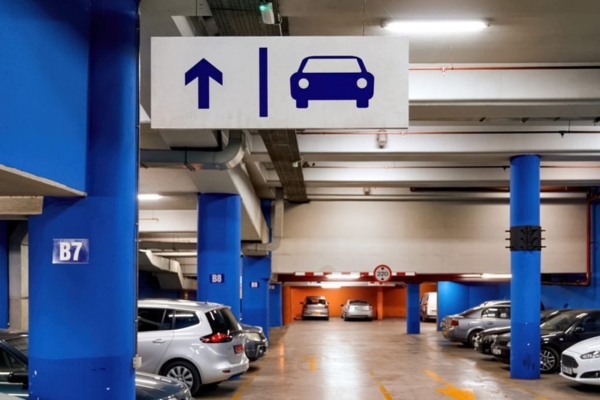
Navigating Tan Son Nhat airport
Tan Son Nhat International Airport features two main terminals: Terminal 1 (T1) for domestic flights (40,948 m²) and Terminal 2 (T2) for international flights (115,834 m²). Below is a detailed guide to help you navigate both areas with ease.
Domestic (T1)
The T1 terminal consists of two floors, designed for smooth and convenient passenger flow:
- Floor 1: Domestic arrival hall with shopping areas, ATMs, restaurants, banks, and restrooms.
- Floor 2: Domestic departure hall with lounges, shops, spas, ATMs, restaurants, banks, and restrooms.
Passengers can easily move between floors using elevators or escalators conveniently located throughout the terminal.
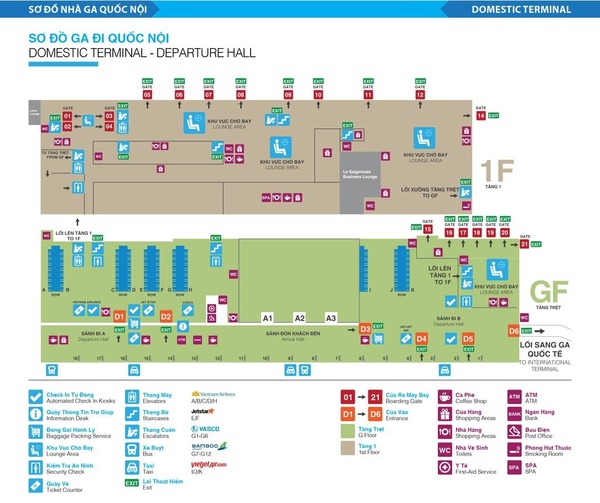
International (T2)
The T2 terminal is nearly three times larger than T1 and operates 24/7 to accommodate international travelers. It includes four main floors:
- Floor 1: International arrivals, transfer and baggage claim counters, lounges, shopping areas, spas, ATMs, restaurants, currency exchange, first aid, and restrooms.
- Floor 2: Immigration area, visa-on-arrival counters, currency exchange, shopping, and dining options.
- Floor 3: Departure hall with check-in counters, spa, currency exchange, sleeping pods, children’s play area, and restrooms.
- Floor 4: Cafes, restaurants, lounges, spas, and additional shopping areas.
For convenient access between floors in T2, passengers can use elevators or escalators located throughout the building.
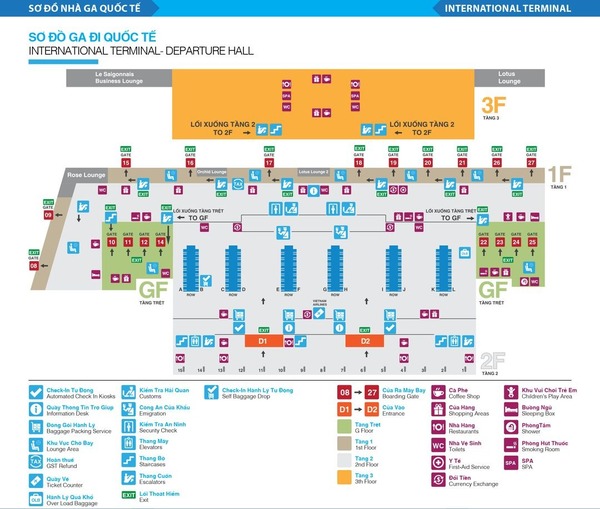
Tan Son Nhat airport departure process
Below is the complete departure process at Tan Son Nhat International Airport (International Terminal), explained clearly so you can navigate it with ease and confidence.
Step 1: Go to the Check-in Area
Where to go: Head to the International Terminal (Terminal 2). The check-in area is located on the 2nd floor.
Check-in counters: The counters are divided into different zones (A, B, C, D, etc.).
- Vietnam Airlines: Usually located in Zone C or D.
- Other airlines: Often found in Zones A or B, but always confirm on arrival.
How to find your counter: Look for your flight on the Flight Information Display Screens (FIDs). These large screens show your flight number, destination, and assigned check-in counter.
Tip: Arrive at least 3 hours before your flight to allow enough time for check-in, security, and immigration.
Step 2: Check-In and Drop Off Luggage
What to do: Go to your airline’s counter and present your passport and ticket (or booking code). If you have checked baggage, hand it over to the airline staff.
Afterward, check your boarding pass carefully. It includes your departure gate number and boarding time.
Tip: Keep your boarding pass in a safe place, as you’ll need it multiple times before boarding.
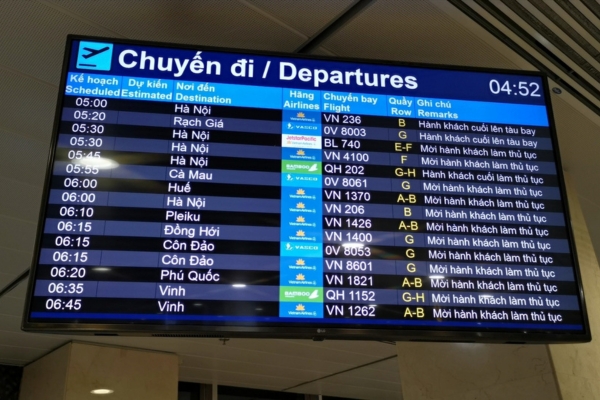
Step 3: Pass Through Immigration
What to do: After check-in, proceed to the Immigration Area. Present your passport and boarding pass to the immigration officer, who will stamp your passport to confirm your departure from Vietnam.
Tip: Immigration lines can get long, especially in the afternoons or on weekends, so remain patient and keep your documents ready for inspection.
Step 4: Security Screening
What to do:
- Place all your bags on the conveyor belt for X-ray scanning.
- Remove liquids, such as water or lotion, and place them in a tray. Each bottle must be 100ml or less and fit within a 1-liter clear zip bag.
- Take off your shoes, jacket, phone, and keys, and place them in the tray before walking through the metal detector.
Tip: Prepare your liquids and electronics in advance to speed up the process. Otherwise, you may have to discard them.
Step 5: Customs (If Required)
- Cash declaration: If you’re carrying over 5,000 USD or 15,000,000 VND, you must declare it to customs officers.
- VAT refund: If you’re a foreign visitor who made purchases in Vietnam, you can claim a tax refund before departure. Make sure to have both the receipts and purchased items ready for inspection.
Step 6: Find Your Gate and Board the Plane
Where to go: After completing security and customs, proceed to your departure gate. Check your boarding pass or the FIDs for gate information. Gates are spread throughout the terminal, so follow the directional signs carefully.
What to do: When boarding begins, present your passport and boarding pass to the gate staff before entering the aircraft.
Tip: Be at your boarding gate at least 30 minutes before departure to avoid missing final calls or unexpected schedule changes.
Facilities and services for departing passengers
Tan Son Nhat International Airport provides a range of facilities to ensure comfort for departing and transit passengers. For those with overnight layovers, the International Terminal offers a free Sleep Zone, equipped with benches for resting. If you prefer more privacy, mini sleeping rooms are available for rent at an affordable rate.
However, for better comfort, consider booking a nearby hotel, just a 3–5 minute walk from the airport. Recommended options include Ibis Saigon Airport Hotel (200m away with free shuttle service), Holiday Inn & Suites Saigon Airport, Tan Son Nhat Saigon Hotel, Parkroyal Saigon, etc.
What to do if you have a long layover?
If you have a long layover at Tan Son Nhat International Airport, here are a few important steps to make your transit smoother and stress-free:
- Adjust to local time: Set your watch or phone to Vietnam’s local time to keep track of your next flight accurately.
- Follow the Transit signs: After arriving, head to the Transit Gate and proceed through security screening before entering the boarding area.
- Check flight details carefully: Note your next flight number, departure time, and destination. Always compare them with the information displayed on airport screens.
- Find your departure gate: Once you confirm your gate and terminal, go directly there to wait. If unsure, ask airport staff for assistance to avoid delays or missing your flight.
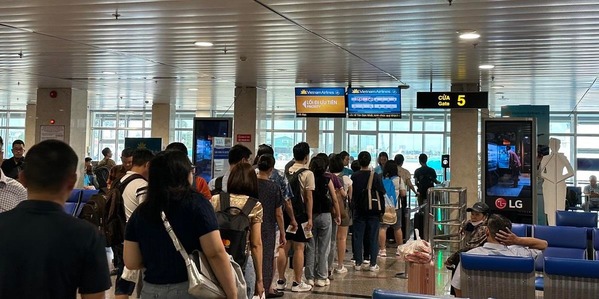
Familiarizing yourself with the Tan Son Nhat airport departure will help you avoid the stress of rush hour, traffic jams or long procedures. With this article, we hope you are ready for a smooth start at Tan Son Nhat. And if you are still confused about applying for a visa or exit procedures, let Wexplore Vietnam help you from A to Z. Contact us now for support!
See more>> Urgent & Emergency Vietnam Visa: Expedited Service 2025

